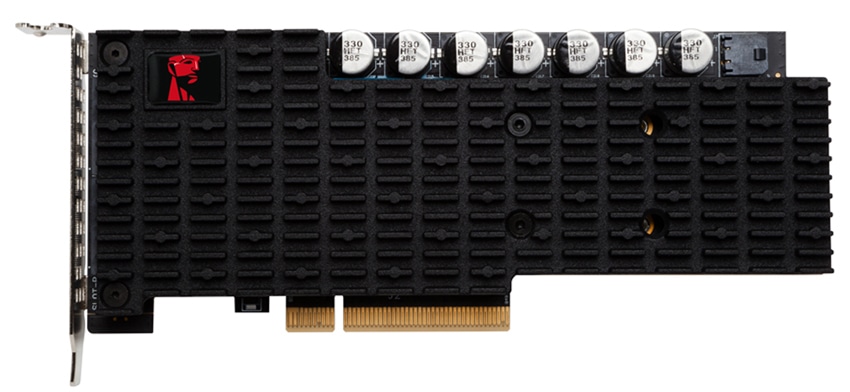![]() At the OCP Summit 2017, Kingston Digital, Inc. announced that it has begun shipping its Data Center PCIe 1000 SSD (DCP1000). The new SSD is aimed at the emerging flash-based data center. The DCP1000 aggregates four individual 8-channel SSDs together to deliver up to a reported 1.25 million IOPS when stressing each of the SSDs in aggregate.
At the OCP Summit 2017, Kingston Digital, Inc. announced that it has begun shipping its Data Center PCIe 1000 SSD (DCP1000). The new SSD is aimed at the emerging flash-based data center. The DCP1000 aggregates four individual 8-channel SSDs together to deliver up to a reported 1.25 million IOPS when stressing each of the SSDs in aggregate.
At the OCP Summit 2017, Kingston Digital, Inc. announced that it has begun shipping its Data Center PCIe 1000 SSD (DCP1000). The new SSD is aimed at the emerging flash-based data center. The DCP1000 aggregates four individual 8-channel SSDs together to deliver up to a reported 1.25 million IOPS when stressing each of the SSDs in aggregate.

Data centers are moving more toward flash as the price comes down and the density goes up. Certain applications need the high-performance such as database optimization, online transaction processing (OLTP), software defined storage, virtual desktop infrastructure (VDI), virtualization, and high-performance computing (HPC). These applications need high performance and Kingston’s DCP1000 says it can deliver up to 7GB/s as well at over a million IOPS.
The DCP1000 is the result of a close engineering partnership with Liqid Inc. The drive features hardware-based pFail, next-gen. ECC data protection, advanced error correction and advanced device monitoring. In terms of flash aggregation, the drive is similar to the older Intel SSD 910 or SanDisk ioDrive2 Duo PCIe SSDs, which present as individual drives to the operating system, requiring software RAID to group into one storage volume.
DCP1000 SSD Features:
- DCP1000 features ultra-fast PCIe Gen 3.0 x8, making it ideal for data centers requiring high performance.
- DCP1000 delivers impressive performance with an ultra-low transactional latency.
- With up to 3.2TB, DCP1000 is a high-capacity NVMe solid-state drive.
- DCP1000 offers enterprise-class power failure protection to maximize uptime.
Specifications:
- Form factor: Half Height Half Length PCIe (AIC)
- Interface: Non-Volatile Memory Express (NVMe) PCle Gen 3.0 x8 Lanes
- Capacities1: 800GB, 1.6TB, 3.2TB
- Sequential Read/Write:
- 800GB: 6,800 / 5,000MB/s
- 1.6TB: 6,800 / 6,000MB/s
- 3.2TB: 6,800 / 6,000MB/s
- Steady-State Random 4k Read/Write:
- 800GB: 900,000 / 145,000 IOPS
- 1.6TB: 1,100,000 / 200,000 IOPS
- 3.2TB: 1,000,000 / 180,000 IOPS
- Latency: (Typical) Read/Write 100us / 30us
- Endurance: Terabytes Written (Whole Drive or combined 4 drives on one card)
- 800GB: 748TB
- 1.6TB: 1500TB
- 3.2TB: 2788TB
- Endurance: Terabytes Written
- 200GB: 187TB
- 400GB: 375TB
- 800GB: 697TB
- Enterprise SMART tools: reliability tracking, usage statistics, life remaining, wear leveling, temperature
- Power Consumption: 35W (Active)
- Storage temperature: -40°C ~ 85°C
- Operating temperature: 0°C ~ 70°C
- Recommend Airflow: 35°C at 500LFM or 40°C at 600LFM
- Dimensions: 168mm x 69mm x 18mm (exclude mounting bracket)
- Weight: 209g
- Vibration operating: 2.17G Peak (7–800Hz)
- Vibration non-operating: 20G Peak (10–2000Hz)
- Power Loss Protection: Yes
- MTBF: 2 million hours
- Warranty/support: Limited 5-year warranty with free technical support
- Operational Environments: Windows 8.1, Windows 10, Windows Server 2012 R2, Windows 7 and Windows Server 2008 R2 via updates or Hotfix driver download, Linux Kernel 3.3 and higher, FreeBSD 10.x/11, VMware vSphere 6.0 (vSphere 5.5 as download driver)
Since the drive presents as four individual NVMe SSDs, VMware support will be a challenge for end users. Instead of a large 800GB, 1600GB or 3200GB datastore that other NVMe solutions would offer, users will instead have to work with four 200GB, 400GB, or 800GB volumes. This is because unlike Windows and Linux, VMware does not offer software RAID support. With the exception of possible vSAN use cases, VMware use cases will be limited because of this.
The new Kingston Digital DCP1000 SSD will be demonstrated in Liqid’s booth (booth #A13) during this year’s Open Compute Project U.S. Summit 2017 (OCP) March 8-9 in Santa Clara, Calif.
Availability
The DCP1000 SSD is currently only shipping in the U.S.
Sign up for the StorageReview newsletter

